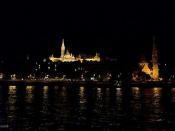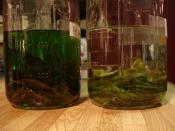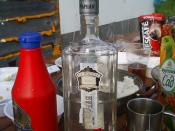Grand Prince Vladimir proclaimed, "Drinking is the joy of the Russes, we cannot do without it". He himself adopted Christianity rather than Islam because it allowed the consumption of alcohol, seen as a reason for the whole country to embrace that faith in AD 900. In the year of 1386, "aqua vitae", more commonly known as vodka, was introduced in Moscow as a medical potion rather than a beverage. Alchemists dedicated extensive treatises to aqua vitae, often considering it the fifth element under the Hermetic writings, the primary four being earth, water, air and fire. There has been a constant relationship between state politics and drinking. The former communist Party first secretary in Minsk was arrested as he tried to arrange the sale of 500,000 bottles of Vodka on the black market. There was Zhirinovsky vodka, Gorbachev vodka, even Terminator vodka. An inebriated Muscovite was found on one of the domes of St. Basil's Cathedral in Red Square, an act that earned him five years in prison for hooliganism.
Even Russian president Boris Yeltsin missed an appointment with the Irish prime minister at Shannon airport in circumstances that were widely attributed to in-flight refreshments. The former vice president, Alexander Rutsoi, would later accuse Yeltsin of being in a "permanent state of visiting Ireland".
Excessive drinking, alcohol abuse, and alcoholism have clearly been a part of Russian and Soviet life for a long time. Scarcities symbolized by the ever-present necessity to stand in line remain a pervasive part of life and a visible reminder of the consistently low priorities given to consumers' needs. There is little doubt, however, that in the 1970s and 1980s, the alcohol problem reached a crisis level unprecedented in the history of the country. Inadequate control of alcohol consumption by the state intensified and social problems including...


